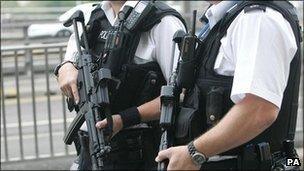Police anti-terrorism stop and searches cease
- Published

Powers in the Terrorism Act were curtailed after a European Court of Human Rights ruling
Police have ceased using anti-terrorism stop and search powers,figures from the Home Office, externalshow.
Between April and September 2011 the powers, which enable police to search anyone for terrorist material in designated areas, were not used once.
During the same period in 2010 there were 9,703 searches, and 66,162 in the same six-month period in 2009.
It follows a ruling by the European Court of Human Rights that use of the anti-terrorism powers was unlawful.
In January 2010, the court said the powers, known as Section 44, were too widely drawn and open to abuse.
They were replaced by more limited measures in England, Wales and Scotland last March, known as Section 47a.
'Startling fall'
Under S47a, police can only carry out searches in areas where it is suspected that an act of terrorism will take place.
Officers can search anyone in that area without needing to have "reasonable suspicion" that an individual is breaking the law.
Between January and March last year 11 people were stopped under S44 and S47a, but from April to September there were no stops.
BBC home affairs correspondent Danny Shaw said it was a "startling fall" which "begs more questions about previous use of powers".
Police can stop and search people if they have "reasonable suspicion" they are carrying terrorist material using different powers, under Section 43 of the Terrorism Act.
Between April and September 2011 figures from the Metropolitan Police show that 450 people were stopped under this power, 58 more than in the same period the previous year.
Figures from other forces for S43 have not been published, but are likely to be very small because the bulk of terrorist-related searches take place in London.
Corinna Ferguson, legal officer for Liberty who successfully challenged section 44 in the European Court of Human Rights, said she welcomed the police and government response to the ruling.
"It was a very blunt instrument that never caught a single terrorist but instead alienated ethnic minorities and peaceful demonstrators by its use," she said.
"Community support is vital in tackling terrorism and the police are far better off without blanket powers that sweep up too many of the innocent with the genuinely suspicious."
The Home Office said the government was "determined to prosecute and convict those involved in terrorist-related activity wherever possible".
"The figures released today demonstrate the continued hard work of the police, agencies and CPS in keeping us safe from people who wish to harm us," a spokesman said.
- Published13 October 2011
- Published15 June 2011